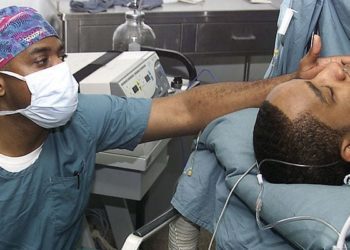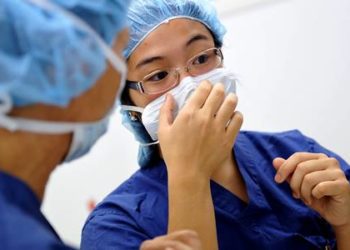Study suggests general surgery residency graduates unprepared for fellowship
Image: PD
1. A survey of surgical subspecialty program directors found that 21% of program directors (PDs) felt that new fellows were unprepared for the operating room.
2. Only 33.7% of subspecialty program directors felt that new fellows could operate for 30 minutes during a major procedure without supervision, and 30% felt that new fellows could not perform a laparoscopic cholecystectomy independently.
Evidence Rating Level: 3 (Fair)
Study Rundown: In the rapidly changing landscape of general surgery, trainees are forced to learn and adopt a great number of new techniques and technologies. With the implementation of duty hour restrictions and decreased resident autonomy, today’s surgical residents are often limited in their exposure and training as compared to previous generations of surgeons. This survey, led by the Fellowship Council (FC) research committee, sought to evaluate the preparedness of incoming surgical subspecialty fellows and to identify shortcomings of general surgery training. This study is inherently limited in its design, as using a survey to gather data is dependent on the subjective evaluations of program directors. Furthermore, program directors that chose to respond to the survey may differ from program directors who chose not to respond. Survey responses were anonymous, and therefore analysis of respondents could not be performed. Moreover, there is no previous data to compare the results of this survey to. Thus, it is difficult to assess if current fellows are less prepared than their predecessors. While the results of this study are disconcerting, they provide constructive feedback to general surgery residency programs and identify areas that deserve attention and improvement.
Click to read the study in Annals of Surgery
Relevant Reading: Early subspecialization and perceived competence in surgical training: are residents ready?
In-depth [survey]: This survey was created by the FC research committee, composed of board members and program directors representing different FC subspecialties. The survey was designed to assess new fellows in 5 educational domains: (1) professionalism, (2) level of independence/graduated responsibility, (3) psychomotor ability, (4) clinical evaluation and management, and (5) academia and scholarship. The final survey had 46 quantitative and 6 qualitative questions. The survey was sent in April and May of 2012 to 145 fellowship program directors (PDs) of accredited FC fellowships, representing all specialties within the FC. The survey was accompanied with a message emphasizing the anonymous nature of the survey, as well as encouraging PDs to globally assess fellows as they entered the fellowship in July of the former year (2011).
The survey was completed by 91 of 145 program directors (63% response rate) over six weeks. In the “professionalism” domain, 38% of PDs felt that new fellows lacked patient ownership. In the “level of independence/graduated responsibility” domain, 42.7% of PDs disagreed or strongly disagreed that new fellows could perform 30 minutes of a major procedure independently. In the “psychomotor ability” domain, 56% of PDs disagreed that new fellows were proficient in laparoscopic suturing. In the “clinical evaluation and management” domain, there was a trend in open-ended responses indicating that fellows ordered excessive tests and overutilized hospital resources to make sure the patient was “okay”. In the “academia and scholarship” domain, 69% of open-ended responses reflected a concern regarding lack of interest among fellows in academic pursuits or scholarship activities.
By James Jiang and Chaz Carrier
More from this author: Mortality after trauma increasingly due to preexisting conditions, Physical examination sufficient to evaluate abdominal stab wounds, Mortality risk higher in pediatric trauma patients with chronic conditions, Patient transfers to trauma centers often unnecessary, Postoperative complications linked with unplanned hospital readmissions
© 2013 2minutemedicine.com. All rights reserved. No works may be reproduced without expressed written consent from 2minutemedicine.com. Disclaimer: We present factual information directly from peer reviewed medical journals. No post should be construed as medical advice and is not intended as such by the authors, editors, staff or by 2minutemedicine.com. PLEASE SEE A HEALTHCARE PROVIDER IN YOUR AREA IF YOU SEEK MEDICAL ADVICE OF ANY SORT.






